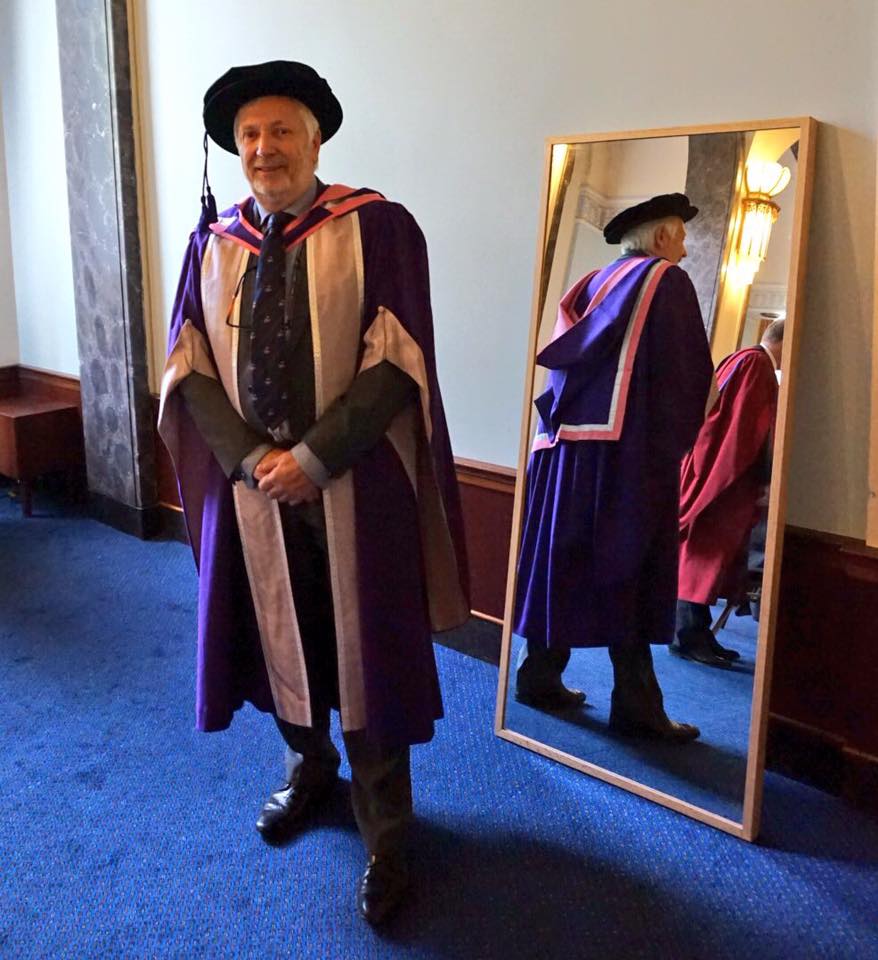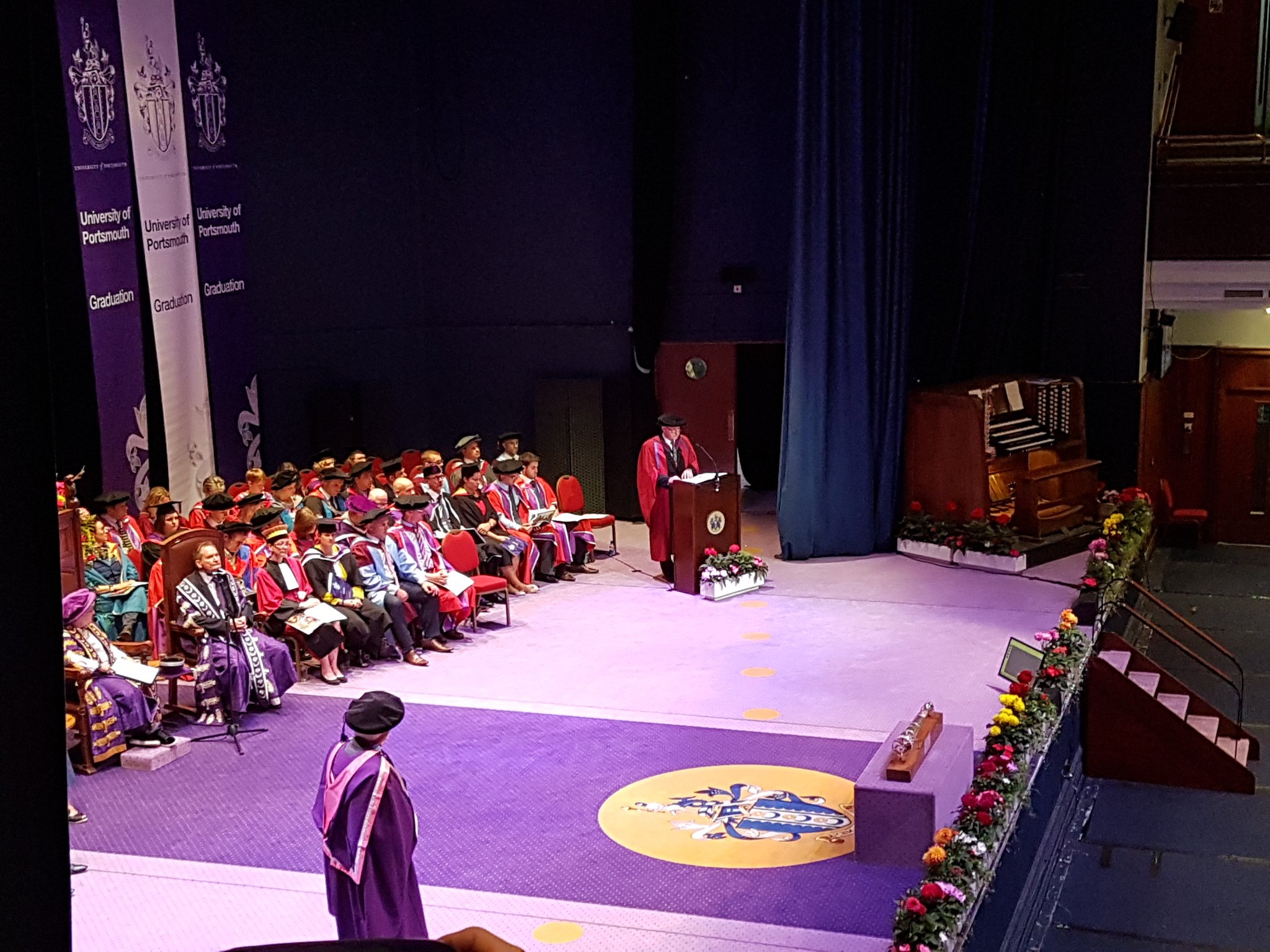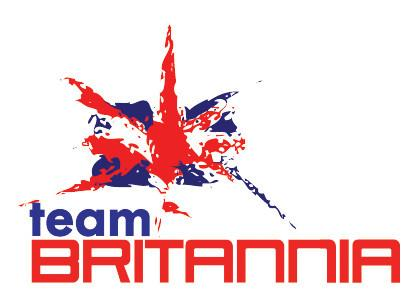Ocean racing legend and skipper of Team Britannia Alan Priddy has been given the University of Portsmouth’s top honour.

Speaking at the ceremony, Professor Mike Tipton praised Alan as a local boy who has “done good,” and that just reeling off his achievements was “far from the whole story.”
“Alan was born in Portsmouth, he was sailing by eight years of age and in charge of a motorised dinghy by the age of 11,” he said.
“A few years later Alan had become a Mod (not a Rocker) and through the association with scooters, developed a passion for fixing them. This hobby turned into a small business when a friend, Pat Nelson, gave Alan access to a workshop in Fratton, and he started fixing bikes, then cars. At the time he was also acting as a labourer for six bricklayers, so focussing on things mechanical probably wasn’t that hard a choice!
“Alan worked on all aspects of bikes and cars until one day one of his customers advised him to “Do one thing properly.” Alan heeded this advice and concentrated on gear boxes, building the specialist “Express Gearbox Company” which now employs 25 people in Portsmouth, and has customers around the globe.

In reply, Alan Priddy commented: “I am deeply, deeply honoured and touched by this award. The University is an important part of our City and preparing young people for the future - so when I first got the letter telling me that I had been proposed to become a doctor, I thought it was a mistake. After all the only test I have ever passed was my driving test! But then I spoke to Professor Tipton and his team and realised they were serious. I was speechless.”
Alan was joined by his family, and crew members for his latest adventure, Team Britannia - the multi-million pound British bid to design and build the fastest and most fuel efficient semi-wave slicing powerboat to circumnavigate the globe.
Team Britannia is a multi-million pound British bid to design and build the fastest and most fuel-efficient semi-wave slicing powerboat to circumnavigate the globe for the much-coveted UIM world record, currently held by the New Zealander Pete Bethune at 60 days 23 hours 49 minutes.
Its revolutionary semi-wave slicing 80ft RIB will slice through the waves, rather than surfing them. The super-efficient boat, the work of esteemed naval architect Professor Bob Cripps has been designed to be both light and incredibly strong. Bob and his design team believe that the revolutionary shape of the boat, a variant of the “fast displacement hull” will reduce fuel consumption by up to 30 per cent and make the 23,000 nautical mile trip smoother and faster.
In addition to the fuel-efficient design, the boat will use a pollution-cutting Water-in-Diesel (WiDE) fuel emulsion to power the two race-tuned Fiat Power Train C13 500, 6 cylinder engines. The boat is being built by the Aluminium Boatbuilding Company near Portsmouth, and they will be fitting the latest navigation and communications equipment from the British marine industry.
Professor Tipton continued: “Amongst his early non-sailing challenges Alan canoed and rowed around the Isle of Wight. He undertook his first challenge in a rigid–hulled inflatable boat (a RIB) in 1990 when he set a record for a journey around Scotland in a 15 foot boat. Several record-breaking journeys followed around Britain (1992), Ireland (1993) and in the Bay of Biscay (1996).
“Alan was second in the 1993 Round Britain RIB challenge, and then in 1997, he attempted the Atlantic Challenge in a 24 foot RIB. The route went from Portsmouth, New Hampshire in the USA to Portsmouth, Hampshire, stopping on the way in Nova Scotia, Newfoundland, Greenland, Iceland and Northern Ireland. Luckily Alan is “fascinated by ice” because he was blocked by it, and found himself in an open boat, 500 miles from safety with 100 miles-worth of fuel on board. He waited five days for an ice-breaker and, 21 days after he set-off, he made it to Portsmouth.
“Further RIB challenges and records followed: London to Monaco in 99 hours and 19 minutes; the Circumnavigation of Britain in five days, six hours and five minutes. In 2002 Alan, Clive Tully and Steve Lloyd attempted to circumnavigate the globe in the custom-built RIB Spirit of Cardiff, one of the largest RIBs in the world at the time with an overall length of 33 feet. But the voyage ran into difficulties and was prematurely concluded when one of the crew suffered heart problems 350 miles from Newfoundland.
“In 2003, Alan attempted to cross from St. John's, Newfoundland to Cape Wrath in Scotland in less than 100 hours. The Spirit of Cardiff was refurbished and became The Jolly Sailor. A gruelling voyage ensued with the boat being battered by 50 knot winds. Despite this Alan set the fastest transatlantic crossing by a RIB. In 2004, Alan attempted to return the Jolly Sailor to Newfoundland to be used by charitable organisations, but the boat was hit by a large wave, sank and the crew had to be rescued.
“You should now understand at least two things. Firstly, Alan is a man who has known disappointment, but persists in the face of it, a good lesson for life; there is a difference between endurance and the ability to endure. Secondly, you now know why an expert in sea survival, rather than engineering, is giving this oration.”
“As of 2012, Alan had recorded 37 world records and 12 British national records.”
Professor Tipton went on to talk about Alan’s work with wounded and injured veterans from the armed forces charity Blesma, who will be joining Team Britannia as they look to shave more than a week off the current world record.
Professor Tipton added: “Having achieved much on the water, if you ask Alan what his proudest moment is he will tell you it is the work he is doing with the charity Blesma, a charity for limbless veterans that includes Team Endeavour. Coincidentally, “endeavour” is probably the word that best describes Alan. It is also a good word for today.”
Alan concluded: “What was particularly pleasing about the award was that I was able to share it with so many young people who have their whole future and careers in front of them, and their families who have supported them through good times and not so good times.
“It was great to see how our City and our University are making such a difference. As the Vice Chancellor said: ‘Be the force for positive change.’ I could not agree more.”
ENDS
Notes to editors:
Team Britannia is a multi-million pound British bid to design and build the fastest and most fuel efficient semi-wave slicing powerboat to circumnavigate the globe for the much-coveted UIM world record, currently held by the New Zealander Pete Bethune at 60 days 23 hours 49 minutes.
The World Record Authorities (UIM) dictate that for a recognised circumnavigation the craft has to pass through the Suez and Panama Canals, cross the Tropic of Cancer and the Equator and must start and finish the journey in the same place.
The boat is a completely new design from Professor Bob Cripps, former Technical Director of VT Halmatic. It has been designed in the UK and will be constructed in the Portsmouth area out of marine-grade aluminium. It encompasses “an exceptionally efficient hull”, which will cut fuel consumption by up to 30 per cent.
In addition to the design the vessel will be powered by a revolutionary fuel emulsion, a mixture of diesel, water and emulsifying agent from Clean Fuel Ltd. This will reduce harmful emissions such as particulate matter and nitrogen dioxide.
The effects of the emulsified fuel on the engines and the emissions will be monitored for the duration of the voyage and the results published online.
The boat is being built out of marine-grade aluminium by the Aluminium Boatbuilding Company based in Hampshire. The metal was produced by Blackburn metals and laser-cut by specialist firm Aalco in Southampton.
The boat will also showcase nearly a dozen leading marine companies, which are supporting the project with their expertise and equipment.
Team Britannia will launch their boat in 2017.
Boat specifications:
Length – 80 feet
Internal beam – 13 feet
External beam – 19 feet
Draft – 30 inches
Material – Marine grade aluminium, including nearly 12km of framing
Hull thickness – 8-10 mm
Build weight – 20 tonnes
Range 4,000 nautical miles
Engines – Two customised Fiat Power Train C13 500, 6 cylinders
Power – Each engine is capable of generating 500HP at 2,000 RPM
Water jets – Two Castoldi turbo drive 490 HC
Fuel – Emulsified diesel (diesel, water and a unique emulsion developed by Clean Fuel and its partners)
Navigation station – Raymarine
Communications equipment - Standard Horizon & Iridium Everywhere
Batteries – Mastervolt
Total crew – 20 (12 onboard with 5 rotating on and off the boat plus 3 shore based)
Crew clothing - Sebago
For more information and regular updates visit: www.teambritannia.co.uk or @team_britannia
For media inquiries, please contact:
Alistair Thompson of Media Intelligence Partners
alistair@teambritanniapr.com | 07970 162 225
